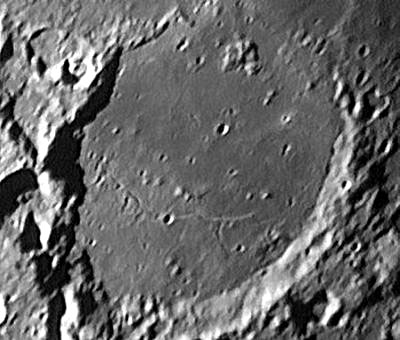Difference between revisions of "April 6, 2004"
| Line 54: | Line 54: | ||
---- | ---- | ||
===COMMENTS?=== | ===COMMENTS?=== | ||
| − | + | Register, and click on the <b>Discussion</b> tab at the top of the page. | |
Revision as of 16:20, 11 January 2015
Fractured Frac
Image Credit: John Sussenbach |
|
Fractured Frac This is another one of the increasingly common amateur images that shows more than a Lunar Orbiter IV photo. John Sussenbach's great webcam image of Fracastorius seems to have about the same resolution as the Orbiter image, but John's lower sun angle brings out delicate rilles (to the far east and south) that aren't hinted at in the spacecraft view. This is, in fact, the best view of Fracastorius in existence. (I love to make statements like that in hopes that someone I've never heard of will send me an even better picture!) Well, what are those fractures? Most craters with fractures on their floors are called floor-fractured craters (duh); John's view of ["../01/LPOD-2004-01-15.htm" Gassendi] is an example where the floor has been uplifted and rilled by an intrusion of magma from below. But Fracastorius's fractures have another origin. They apparently formed as the weight of Mare Nectaris lavas caused the center of the Nectaris basin to subside. John's image shows shorter fractures at right angles to the main one. Also, notice the two small hills on the southern portion of the crater's floor. I don't know why they are there - are they volcanic cones?? Technical Details: Related Links: Tomorrow's LPOD: Colorful Privolva |
Author & Editor:
Charles A. Wood
Technical Consultant:
Anthony Ayiomamitis
A service of:
ObservingTheSky.Org
Visit these other PODs:
Astronomy | Mars | Earth
COMMENTS?
Register, and click on the Discussion tab at the top of the page.




